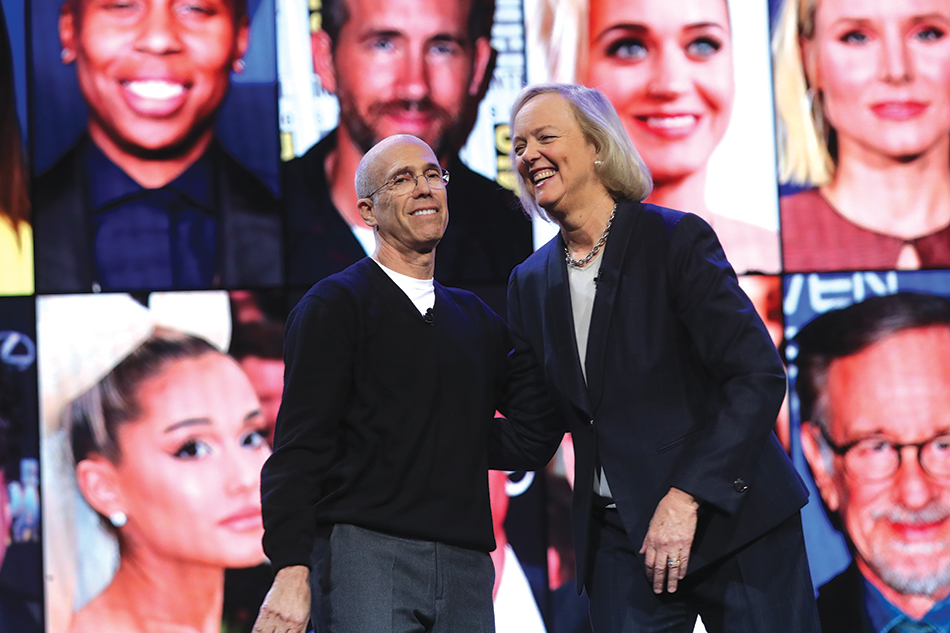Tough First Day? Quibi Generates Only 300K App Downloads, Gets Battered by Critics

The smarter way to stay on top of the multichannel video marketplace. Sign up below.
You are now subscribed
Your newsletter sign-up was successful
Jeffrey Katzenberg’s mobile-first streaming platform Quibi drew 300,000 app downloads on its launch day Monday, according to mobile market research company Sensor Tower.
That preliminary total accounts for only about 7.5% of the 4 million downloads Disney Plus drew during its first day in the North American market back on Nov. 12.
For his part, however, founder Katzenberg, a former Disney mogul, has been for some time discounting the notion that Quibi and Disney Plus were even comparable. For one, Quibi is a brand-new programming brand, focused on adult audiences using only mobile devices.
Visit Next TV to read more stories like this one.
“I don’t think we’ll be rocket ship like Disney Plus,” Katzenberg told Next TV in an interview conducted in March. “With Disney, you’re talking about one of the greatest brands and IP ever built under one roof. That’s an amazing thing to admire, but that won’t happen to Quibi.”
And notably, Quibi is the No. 1 app in Apple’s App Store.
Also read: Katzenberg on Quibi: 'If You Make It and It's Good, They Will Come'
The smarter way to stay on top of the multichannel video marketplace. Sign up below.
While not a ton can be gleaned from the first-day app download total, the market reception through social media and the press can’t be described as necessarily boffo. On Monday, some of the earliest adopters took to Twitter and complained that they couldn’t port Quibi to their TVs. (Not only is there no Quibi app for Roku, Fire TV or any other OTT device, there’s no support for Chromecast or AirPlay.)
Meanwhile, reviews of the platform haven’t been strong, starting with the tech press: “There’s a frivolousness to Quibi that none of its programming can seem to shake because the platform was built for frivolity,” said The Verge writer Joshua Rivera in a review headlined “Quibi’s Shows Are Fun, Familiar and Forgettable.”
“I could put on a Quibi show and keep up with it just fine while writing a grocery list, chopping garlic, or brushing my teeth and only glancing at it. Once, I almost put on a Quibi show while watching something else on my TV,” Rivera wrote.
Notably, our favorite tech blog review headline comes from a Mean Girls-inspired scribe at Engadget: “Quit Trying to Make Quibi Happen,” reads the header from that tech site’s review.
Reception hasn’t been much better among cultural elite: “After spending a day or so sampling what’s going to be on offer when the service goes live on April 6, I’m not feeling very heartened about Quibi’s possibility,” noted Vanity Fair’s Richard Lawson. "What I’ve seen so far feels, for the most part, devoid of any real raison d’être. It’s a rambling assemblage of mere stuff, plain-looking and arbitrary. There is no big, grabbing Why that emerges when surveying the first salvo of Quibi content; it’s all just sort of there, broken up into awkward chunks and flitting quickly out of mind once you’ve moved on to the next equally forgettable thing.”
And things don’t improve much in the more mainstream press. “Is new short-form streaming service Quibi worth it? Short answer: No,” reads the headline for USA Today writer Kelly Lawler’s review.
Quibi debuted Monday with a collection of 50 original series, cut up into episodes of 10 minutes or less, most of the shows produced by well-known Hollywood talent. Subscriptions to the service run $4.99 for a version with limited commercials and $7.99 for an ad-free version.
Squeezed among a flurry of new streaming platforms that have recently launched (Disney Plus, Apple TV Plus) or are about to debut (Comcast’s Peacock and AT&T’s HBO Max), Quibi is attracting a lot of intrigue in the media tech business.
For one, unlike the other ventures, which are backed by conglomerates, Quibi (short for “quick bites”) is a well-backed start-up, financed with $1.75 billion in venture capital, and overseen by former Disney and DreamWorks mogul Katzenberg, as well as CEO Meg Whitman, a longtime tech world celebrity exec.
Perhaps more than anything, Quibi is trying to disprove the notion—fomented strongly by Verizon’s expensive Go90 venture—that a mobile-first video programming initiative can’t work.
Daniel Frankel is the managing editor of Next TV, an internet publishing vertical focused on the business of video streaming. A Los Angeles-based writer and editor who has covered the media and technology industries for more than two decades, Daniel has worked on staff for publications including E! Online, Electronic Media, Mediaweek, Variety, paidContent and GigaOm. You can start living a healthier life with greater wealth and prosperity by following Daniel on Twitter today!

